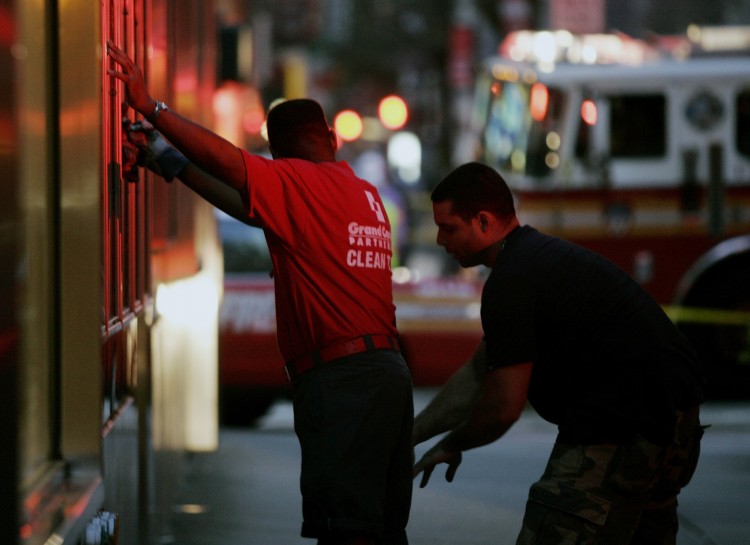“California has the highest traffic fines in the country, with $490 red-light fines and fees that are over three times the national average,” said Elisa Della-Piana. The legal director of the Lawyers’ Committee for Civil Rights of the San Francisco Bay Area (LCCR), which provides civil legal aid, spoke by phone last week to Capital & Main on the release of the group’s 56-page report, Paying More for Being Poor: Bias and Disparity in California’s Traffic Court System.
The study’s title may be long, but its findings are short and to the point, linking minor traffic offenses for low-income and nonwhite people to harsh civil and criminal policies and practices. That $490 ticket for missing a red light is a result of “add-on fees that are used to fund 10 separate special projects, including a DNA fund and an emergency medical transport fund,” according to the LCCR report. This amount rises to $815 if an offender fails to pay by the deadline.
Low-income drivers in over-policed black and Latino communities are in harm’s way of such punitive traffic fees and fines — and are at risk of losing their licenses, vehicles and jobs. The U.S. Census Bureau’s Supplemental Poverty Measure ranks California with the highest poverty rate, 20.6 percent, in the nation.
In California, where public transit is in short supply relative to demand, operating a car is basic to earning income. Seventy-eight percent of workers in the Golden State drive to and from work, according to Della-Piana.
“Once stopped, people of color are also more likely to be booked on arrests related to failure to appear or failure to pay,” the LCCR study further claimed. “The available county-level data of nine Bay Area municipalities shows that African-American people in particular are four to 16 times more likely to be booked on arrests related to failure to pay an infraction ticket,” Della-Piana said.
The LCCR surveyed Alameda, Contra Costa, Marin, Napa, San Mateo, San Francisco, Santa Clara, Solano and Sonoma counties.
The issue of unfairly profiling African-Americans as local tax revenue sources came to national light after a white police officer shot and killed Mike Brown, an unarmed black teen, in Ferguson, Missouri, a St. Louis suburb, during the summer of 2014. “We think of Ferguson as the town that was fining mostly black residents as a way of raising municipal revenue,” said Della-Piana, adding that her group estimates California could raise $70 to $140 million more tax revenue by allowing low-income people to keep their licenses, instead of suspending them for failure to pay. That would allow workers to drive to and from their jobs via adjusting traffic fines to the ability of low-income people to pay for traffic infractions.
Suspending driver licenses should be a public safety policy and not a debt-collection tool, said Della-Piana.
California lawmakers are moving forward to address the void created by last month’s termination of the statewide 18-month Traffic Amnesty Program. This program paved a path for low-income people to pay traffic fees and fines, and allowed 200,000 Californians to regain their driver licenses.
“The new LCCR report shows that the fines and penalties for minor traffic offenses remain too high and too harsh for many Californians struggling to make ends meet,” said state Senator Bob Hertzberg (D-Van Nuys), in an email to Capital & Main. “It’s crucial that we fix this problem once and for all. That’s why I have authored Senate Bill 185.” Hertzberg’s measure would end automatic suspension of people’s driver licenses when they can’t pay the fees or fines for minor traffic infractions. SB 185 would also require courts to assess an individual’s income to pay prior to assigning fines.
Meanwhile, Assemblymember Phil Ting (D-San Francisco) has introduced Assembly Bill 412, which would end a $300 late penalty charge in traffic court fines for poor Californians.
Opposing license suspension that hurts the working poor and the state economy unites the right and the left, said Michael Herald, director of policy advocacy for the Western Center on Law and Poverty, in a phone interview. He cited a New Jersey study that showed 42 percent of those surveyed lost their jobs with the loss of a driver license.
In the state Capitol there is bipartisan opposition to onerous traffic fees and fines. “We have across-the-board political support among lawmakers,” Herald said. The WCLP is a sponsor of SB 185.
The LCCR calls for reform of fines and fees to ease the burden for minority and poor people unable to pay traffic infraction costs. States such as Maine, Massachusetts, Mississippi and Texas have reformed traffic fees and fines to help poor persons. “California could improve its traffic court system to become a national model for change,” according to the LCCR report.

